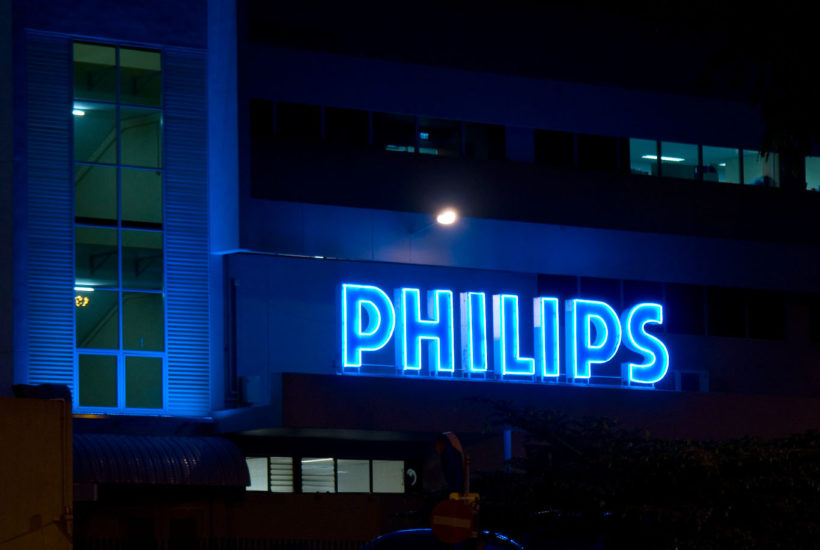Biotech
Philips Will Install a Hemodynamic Room in a Hospital in Leon
Philips will install a hemodynamics room in the cardiology department of the Complejo Asistencial Universitario de León. This project is financed by the European Union through the Recovery and Resilience Mechanism-NextGeneration EU. The contract in question covers the commissioning of an Azurion Cardiac Suite angiograph, costing $1.09 million (€957,648), and a Philips Hemo System polygraph.

Philips continues to enlarge its footprint in the healthcare system of Castilla y León. The Dutch technology giant has been awarded a contract with the administration presided over by Alfonso Fernando Fernández Mañueco to set up a new hemodynamics room in Léon for one million euros, according to a document from the Regional Health Management and the Regional Executive’s Department of Health. The current angiograph for interventional hemodynamics is also due to be removed.
The multinational will install a hemodynamics room in the cardiology department of the Complejo Asistencial Universitario de León. This project is financed by the European Union through the Recovery and Resilience Mechanism-NextGeneration EU.
The contract in question covers the commissioning of an Azurion Cardiac Suite angiograph, costing $1.09 million (€957,648), and a Philips Hemo System polygraph, at a cost of $8,412 (€7,349). The execution period is sixty days.
If you want to find more details about Philips and the installation of a hemodynamics room in the cardiology department of the Complejo Asistencial Universitario de León, download the Born2Invest mobile app. Our companion app brings you the most important business headlines in the world so you can stay on top of the market.
Philips is awarded a contract, whose execution period is sixty days
“The justification for the need to acquire a hemodynamics room is based on the renewal of existing obsolescent technology and the current one is nearing the end of its useful life,” according to the Government of Castilla y León.
The latest version of Azurion brings major benefits to interventional cardiology, such as the ability to control specialized cardiac diagnostic and therapy tools on a table-side touchscreen to help make quick, informed decisions without breaking sterility. With the polygraph, the company can bring advanced hemodynamic measurements to the interventional laboratory to support clinical decision-making.
Recently, in Castilla y Léon, Philips was awarded a 419,000 euro contract to supply two X-ray rooms for the Hospital Universitario Rio Hortega in Valladolid. The contract covers two monitored digital radiography rooms with ceiling suspension, three flat detectors, and automatic telemetry. In addition to the works and maintenance, the contract also includes training for the center’s radiodiagnosis service professionals.
Philips improved sales of its diagnostics division by 9% in the third quarter
Philips is a technology company specializing mainly in the electronics and healthcare sectors. In the third quarter of 2021, the company’s diagnostics division increased sales by 9% to $2.46 billion (€2.15 billion).
Between January and September, the company’s revenues reached $14 billion (€12.2 billion), up 1.1% compared to the first nine months of 2020. Beyond Castilla y León, Philips has participated in other projects such as the remodeling of the children’s hemodynamics room at the Gregorio Marañón University Hospital. The company installed the Azurion Pediatric Suite system in the new pediatric hemodynamics room, which combines in the same platform improved usability that allows the professional to focus his attention on the pediatric patient, the Clarity dose reduction system, and improved 2D and 3D image quality in real-time.
__
(Featured image by Chuwa (Francis) CC BY-SA 2.0 via Flickr)
DISCLAIMER: This article was written by a third party contributor and does not reflect the opinion of Born2Invest, its management, staff or its associates. Please review our disclaimer for more information.
This article may include forward-looking statements. These forward-looking statements generally are identified by the words “believe,” “project,” “estimate,” “become,” “plan,” “will,” and similar expressions. These forward-looking statements involve known and unknown risks as well as uncertainties, including those discussed in the following cautionary statements and elsewhere in this article and on this site. Although the Company may believe that its expectations are based on reasonable assumptions, the actual results that the Company may achieve may differ materially from any forward-looking statements, which reflect the opinions of the management of the Company only as of the date hereof. Additionally, please make sure to read these important disclosures.
First published in PlantaDoce, a third-party contributor translated and adapted the article from the original. In case of discrepancy, the original will prevail.
Although we made reasonable efforts to provide accurate translations, some parts may be incorrect. Born2Invest assumes no responsibility for errors, omissions or ambiguities in the translations provided on this website. Any person or entity relying on translated content does so at their own risk. Born2Invest is not responsible for losses caused by such reliance on the accuracy or reliability of translated information. If you wish to report an error or inaccuracy in the translation, we encourage you to contact us.

-

 Crowdfunding1 week ago
Crowdfunding1 week agoSavwa Wins Global Design Awards and Launches Water-Saving Carafe on Kickstarter
-

 Biotech2 weeks ago
Biotech2 weeks agoAsebio 2024: Driving Biotechnology as a Pillar of Spain and Europe’s Strategic Future
-

 Business3 days ago
Business3 days agoDow Jones Nears New High as Historic Signals Flash Caution
-

 Business2 weeks ago
Business2 weeks agoFed Holds Interest Rates Steady Amid Solid Economic Indicators













